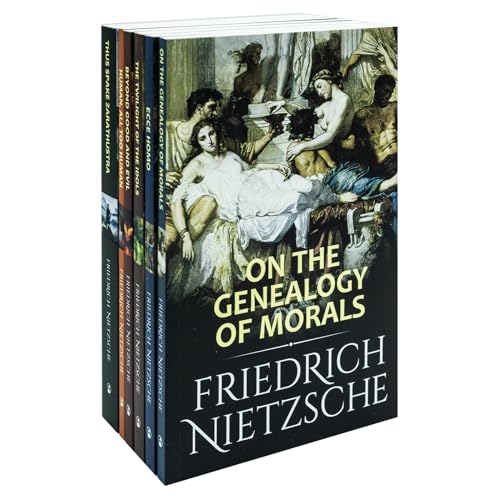Price
Shop / friedrich nietzsche books
Streamlined Title: Beyond Good and Evil - for Gamers
In 1886, philosopher Friedrich Nietzsche published his book "Beyond Good and Evil: Prelude to a Philosophy of the Future." This work draws upon and expands the ideas presented in his previous work, "Thus Spoke Zarathustra," but with a more critical and polemical approach. Nietzsche accuses past philosophers of lacking a critical sense and blindly accepting dogmatic premises in their consideration of morality.
Specifically, Nietzsche argues that these philosophers have founded grand metaphysical systems upon the faith that the good man is the opposite of the evil man, rather than just a different expression of the same basic impulses that find more direct expression in the evil man. The work, "Beyond Good and Evil," moves into the realm "beyond good and evil" in the sense of leaving behind the traditional morality which Nietzsche subjects to a destructive critique in favour of what he regards as an affirmative approach that fearlessly confronts the perspectival nature of knowledge and the perilous condition of the modern individual.
Nietzsche's critical approach in "Beyond Good and Evil" challenges the prevailing moral assumptions of his time, questioning the validity of the dichotomy between good and evil. He suggests that this dichotomy is a simplistic and dogmatic premise that has been uncritically accepted by past philosophers. Instead, Nietzsche proposes a more nuanced and complex understanding of human nature, where the good and the evil are not mutually exclusive but rather different expressions of the same underlying impulses.
By moving "beyond good and evil," Nietzsche seeks to create a new philosophical framework that embraces the perspectival nature of knowledge and the inherent complexity of the human condition. He rejects the notion of a universal, objective morality and encourages a more affirmative approach that confronts the perilous state of the modern individual. This shift in perspective allows Nietzsche to offer a more comprehensive and insightful understanding of the human experience, one that challenges the traditional moral paradigms and opens the door to a more nuanced and profound exploration of the human condition.
The publication of "Beyond Good and Evil" in 1886 marked a significant moment in Nietzsche's philosophical journey, as he continued to push the boundaries of traditional philosophical thought and pave the way for a new understanding of morality and the human experience. Through his critical analysis and his affirmative approach, Nietzsche sought to redefine the philosophical landscape and challenge the preconceptions that had long dominated the field.
product information:
| Attribute | Value | ||||
|---|---|---|---|---|---|
| publisher | CreateSpace Independent Publishing Platform (November 6, 2018) | ||||
| language | English | ||||
| paperback | 116 pages | ||||
| isbn_10 | 9781503250888 | ||||
| isbn_13 | 978-1503250888 | ||||
| lexile_measure | 1420L | ||||
| item_weight | 5.8 ounces | ||||
| dimensions | 6 x 0.27 x 9 inches | ||||
| best_sellers_rank | #19,376 in Books (See Top 100 in Books) #1 in Philosophy Criticism (Books) #2 in Philosophy Aesthetics #5 in Individual Philosophers (Books) | ||||
| customer_reviews |
|













